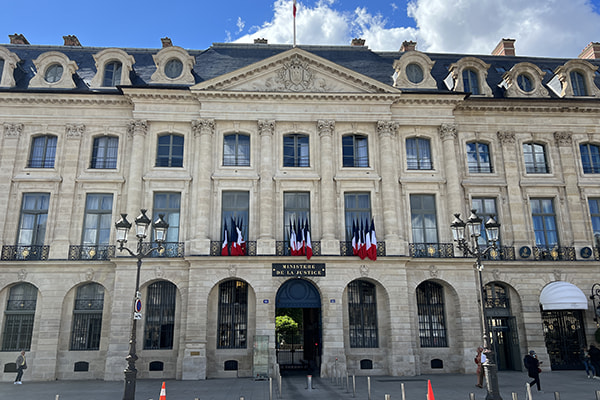- Research,
‘Exploring career management in the justice system’: words from Nawel Sidi Ali Cherif, senior lecturer at TSM

• Can you briefly describe your career path and what brought you to TSM / UT Capitole?
I entered higher education and research after eighteen years in consulting: thirteen years in communications at small Parisian agencies, then five years in human resources, specifically recruitment, at a large group in Lorraine.
My academic training in Management was built in several stages: Master's degree at Paris-Dauphine (2001), Master 2 in HRM (2014) and Master 2 in Research (2020) at IAE Nancy. After completing a PhD in Management Sciences at the University of Lorraine, within the CEREFIGE laboratory, during which I joined the FNEGE's CEFAG doctoral programme (2022), I was an assistant lecturer for one year in Nancy
Since September 2024, I have been a Senior Lecturer at Toulouse School of Management (TSM), working within the HRM & Organisational Behaviour team and as Academic Director of the Master 1 Track Human ressource management programme.
• What are your main research topics?
Since completing my Master's thesis, I have developed a keen interest in ‘careers’, understood as professional trajectories marked by both individual and structural challenges. Perhaps this reflects my own personal development! In any case, my main research topic remains ‘careers’.
I approach it as a particularly rich analytical perspective from the point of view of management sciences, as it allows us to understand how individuals and organisations interact through the employment relationship that binds them, especially in an ever-changing environment.
Careers are influenced both by professional and personal aspirations at the individual level, and by human resource management policies at the organisational level, within a given institutional and societal context.
It faces many challenges: gender, diversity, mobility, training, skills, assessment, work-life balance, etc. In other words, it is both a reflection and an analyser of the multi-level interactions that take place within organisations. Many research questions remain to be explored. After decades of focusing on individual responsibility and autonomy, careers are returning to the forefront of organisational thinking. Today, they are establishing themselves as a strategic, structuring and essential lever for contemporary organisations, whether private or public, seeking to renew their performance.
I approach it as a particularly rich analytical perspective from the point of view of management sciences, as it allows us to understand how individuals and organisations interact through the employment relationship that binds them, especially in an ever-changing environment.
Careers are influenced both by professional and personal aspirations at the individual level, and by human resource management policies at the organisational level, within a given institutional and societal context.
It faces many challenges: gender, diversity, mobility, training, skills, assessment, work-life balance, etc. In other words, it is both a reflection and an analyser of the multi-level interactions that take place within organisations. Many research questions remain to be explored. After decades of focusing on individual responsibility and autonomy, careers are returning to the forefront of organisational thinking. Today, they are establishing themselves as a strategic, structuring and essential lever for contemporary organisations, whether private or public, seeking to renew their performance.
• Could you share a concrete example or recent project that illustrates your work?
I explored careers as a crucial issue in HRM through my doctoral research, in a field that is virtually unexplored by management sciences: the judicial system and its approximately 9,000 magistrates.
I was able to access this emblematic field in 2019, when I joined a contract research team commissioned by the Robert Badinter Institute and supported by the CEREFIGE laboratory.
This study, whose report was published in March 2022, examined the HRM model for magistrates for the first time.
My thesis then focused on managing their careers as a lever for organisational transformation. The careers of magistrates are both a guarantee of the independence of the judiciary and an HR lever for its modernisation. While recent reforms aim to provide the judicial system with an exemplary HR strategy, my work has shown that the implementation of career management rules, in the interaction between independent magistrates and a centralised organisation, actually tends to: compartmentalise the two branches of the same judicial body, the bench and the prosecution service; relegate local justice to the periphery of an elite justice system; differentiate the spheres in which men and women build their careers; keep regional courts at a distance from the privileges of the Parisian microcosm; and position magistrates who have changed careers as outsiders vis-à-vis the original insiders.
These results represent both a realistic and critical test of the Justice Department's modernisation policy and a call to rethink the management of magistrates' careers, taking into account its systemic functioning and the effects it produces, beyond the stated strategic intentions.
I was able to access this emblematic field in 2019, when I joined a contract research team commissioned by the Robert Badinter Institute and supported by the CEREFIGE laboratory.
This study, whose report was published in March 2022, examined the HRM model for magistrates for the first time.
My thesis then focused on managing their careers as a lever for organisational transformation. The careers of magistrates are both a guarantee of the independence of the judiciary and an HR lever for its modernisation. While recent reforms aim to provide the judicial system with an exemplary HR strategy, my work has shown that the implementation of career management rules, in the interaction between independent magistrates and a centralised organisation, actually tends to: compartmentalise the two branches of the same judicial body, the bench and the prosecution service; relegate local justice to the periphery of an elite justice system; differentiate the spheres in which men and women build their careers; keep regional courts at a distance from the privileges of the Parisian microcosm; and position magistrates who have changed careers as outsiders vis-à-vis the original insiders.
These results represent both a realistic and critical test of the Justice Department's modernisation policy and a call to rethink the management of magistrates' careers, taking into account its systemic functioning and the effects it produces, beyond the stated strategic intentions.
• How does your research interact with other disciplines or approaches, and what do you gain from these exchanges?
It should be noted that career research has its roots in several disciplines, including psychology and sociology. The study of career management within organisations is based on the internal market approach in economics. The diversity of these foundations gives the field of careers a cross-disciplinary nature that encourages multidisciplinarity. My research training has been interdisciplinary from the outset, thanks to my collaboration with colleagues in sociology and law as part of contract research on human resource management for magistrates. This cooperation continues today through a new study, this time focusing on court clerks in the judicial system.
I am convinced that management is a science that gains depth through interdisciplinarity.
Investing in a complex field such as justice, without being a lawyer myself, required a long process of acculturation, made possible thanks to exchanges with my colleagues in law. And to analyse this field, which until then had been far removed from any managerial approach, I also drew on the contributions of rich sociological work. In my view, it is through this complementarity that dialogue between disciplines allows us to better understand the complexity observed and to strengthen the relevance of our analysis. Admittedly, this can lead to ‘intense’ exchanges, but if everyone is open-minded and willing to learn from each other, these exchanges become particularly stimulating. My previous professional experience in consulting, where I was already bringing together different professions and approaches to design tailored solutions, undoubtedly fuels my interest in collaboration and interdisciplinary work in research. I am convinced that management is a science that gains depth through interdisciplinarity.
• How does your research contribute to addressing current societal issues or shedding light on the socio-economic world?
This is one of the reasons that led me to pursue an academic career. I am committed to investing myself in research with high potential for contribution, and not just theoretical research. For a long time, a career was a rather elitist concept, considered the preserve of executives. Today, it is becoming more democratic: understanding it as a professional life trajectory shows that it concerns everyone. And because of the many socio-economic issues it touches on, it is at the heart of our society's concerns. The areas of research I am involved in are, by their very nature, relevant to society. Starting, of course, with justice, the pillar of the rule of law and democracy. The proper functioning of justice, particularly in terms of HRM, is, in my view, a key issue.
Careers have long been a rather elitist concept, considered the preserve of executives. Today, they are becoming more accessible to everyone.
For just over a year, I have also been participating in another collective research project, commissioned by the ARS Grand-Est and supported by the CEREFIGE laboratory, which aims, among other things, to identify the levers for effective HR management in emergency departments in public hospitals. Here again, this is a sector of public service that has been facing a crisis for several years, in which the career of emergency doctors is a critical issue. Although these areas fall within the public sector, my work can also shed light on comparable issues in private organisations. These are, in a way, archetypal case studies that allow me to conceptualise more widely transferable models of analysis. I am actively working to promote all of these contributions!
• What motivates you most in your work as a researcher and in the prospects for your research?
What motivates me most in my ‘new’ job as a researcher is the opportunity to take a step back and gain perspective on the phenomena I study. The long period of reflection and analysis, in contrast to the immediacy of results that guided my previous professional life, allows me to examine each question in depth and grasp all its dimensions. For me, being a researcher also means acting as a scout before the action: providing keys to understanding that can guide practices, with rigour, realism and critical distance.
It is the privilege of discovery and the right to feed one's curiosity without limit. What also motivates me is exchange and collaboration, particularly at the international level, around the universal language of research. Sharing ideas, comparing points of view and co-constructing knowledge with colleagues from different disciplines and cultures enriches my research as much as it does my worldview and my academic career.
For me, being a researcher also means acting as a scout before taking action.
It is the privilege of discovery and the right to feed one's curiosity without limit. What also motivates me is exchange and collaboration, particularly at the international level, around the universal language of research. Sharing ideas, comparing points of view and co-constructing knowledge with colleagues from different disciplines and cultures enriches my research as much as it does my worldview and my academic career.
* Chabe01, licence CC BY-SA 4.0 — voir détails

